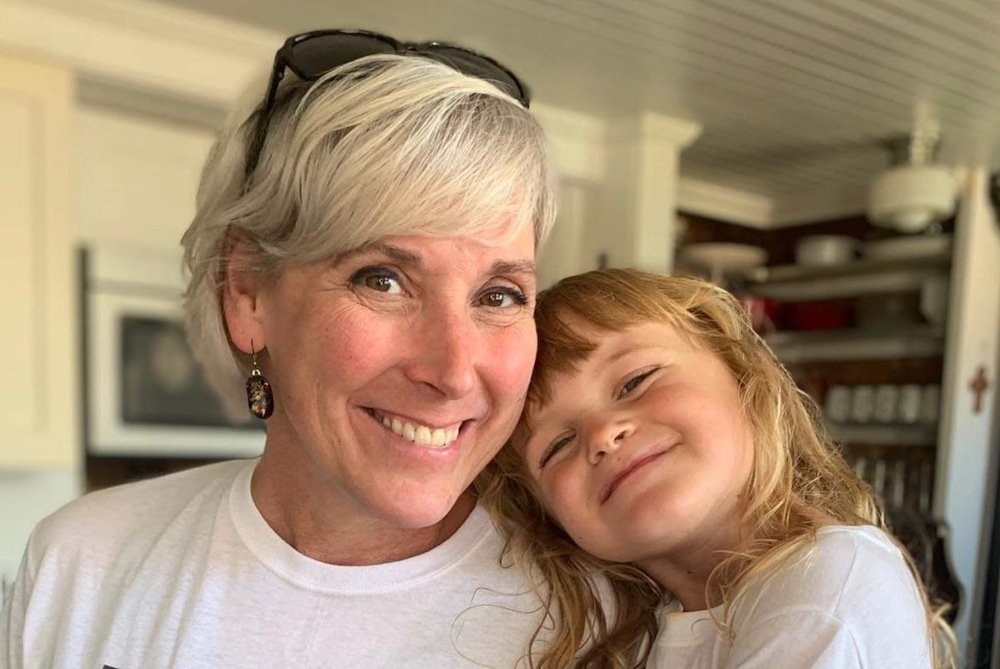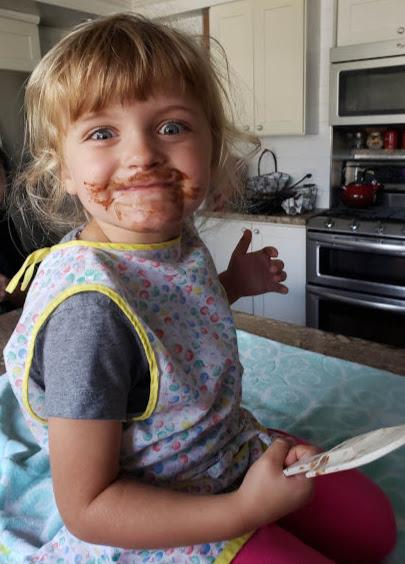
Amy Morris-Young, left, with her granddaughter Mary (Provided photo)
As the late, great comedienne Joan Rivers often said: "Can we talk?!"
Can we talk about how wonderful grandchildren are? I mean, really, who knew about the joy that was coming if we could only survive our kids' teenage years and early 20s?
Our youngest granddaughter Mary, now 4 and a half years old, gave me maybe the best compliment of my life the other day. We were just rolling along in the car, she in the back strapped into her booster seat, a color book on her lap, humming to herself, and me driving, stealing occasional glances at her sweet serious face in the rearview mirror.
She looked up and said, "Nonna, you know why I love you so much?"
My breath caught and I smiled at her reflection in the mirror, "No, why?"
"Because you're quick with a joke and a light up my smoke."
I almost had to pull the car over, I laughed so hard.
You see, her Momma, my daughter Chelsea, sings Billy Joel's song "Piano Man" to Mary each night as they snuggle at bedtime. Those lyrics whispered into Mary's ear in the near-darkness, safe and warm in her Momma's arms, clearly equated to the highest possible praise she could think of. And she bestowed that phrase onto me. Breathtaking. Hilarious. Magic.
I'll take it.
Because it is a truth known to all us grown-ups — but blessedly not by Mary quite yet — that life is hard. Really hard sometimes. And it seems to be a universal truth that trouble comes in clusters, one hard thing after another, like so many heavy wet fall leaves pushed by some cosmic wind into a pile, under which we struggle to not panic and keep breathing, wondering which leaf to move first to climb our way out.
It seems far easier to tackle those items we can actually do something about — schedule those expensive repairs on the car, pay the plumber to finally make that toilet stop running, bite the bullet and admit the necessity of replacing that cranky water heater — than face the ones about which there is little if anything we can actually do to help.
Advertisement
When our child is struggling with mental health issues — and the self-medicating with substances that often comes with that — we feel so helpless and stupid and afraid. Why hasn't science figured out how to re-balance brain chemistry yet? How do we reach through the stigma and shame they feel, and soothe the anxiety and agitation that keep them separated from themselves, their magnificent selves that at this moment, perhaps only we can remember?
When our parents are aging and facing deterioration in both their bodies and minds, we feel similarly ineffectual and lame. How do we assure them that they are still vastly important to us, vital in our family, when our main interaction has devolved into helping them get to the doctor, or the grocery store, or the toilet? That they have not lost their hard-earned seniority just by becoming senior citizens?
When our spouses are grappling with illness or injury, and their accompanying depression, feeling less like partners than patients, we can feel spectacularly unhelpful. The cheerier we are as caregivers the guiltier they feel. They don't want to be the recipient of our kindness; they want to be trading it back and forth in the dance of love and relationship we usually share.
And when we ourselves become tired and sad and overwhelmed by what is happening in the world, our faith in our fellow humans sorely tested by one news story after another — pummeling us with hate and bigotry and cruelty and war — and our faith in God stretched by wondering why this is allowed to be, we ponder where on Earth we will find the last drop of hope we need to continue forward?
I'll tell you where I gratefully and blessedly find it. In a sudden barrage of ridiculous jokes from this goofy toddler grandkid, that's where.

Mary makes some cupcakes in September. (Amy Morris-Young)
Without warning, Mary yells at the top of her lungs from right next to me in the kitchen: "Nonna! Knock-knock!"
I look up from slicing food on the cutting board, "Who's there?"
She says, "The scary cow."
I say, "The scary cow, who?"
She splays her fingers around her face, her eyes huge, "Moooooooooooooo!"
Can we talk about how hard she laughs at her own jokes? How great it is that out of nowhere, she can so thoroughly crack herself up? And me, too, in the process?
If we are all so isolated in our own pains and struggles, and polarized by our righteous opinions, can we please all stop for one moment and agree that this amount of random joy is so startling as to be miraculous?
I saw Joan Rivers once, live at Seattle's Benaroya Hall, a couple of years before she died. She was 78 years old, this tiny woman in a huge bright pink fur coat, whose body kept in motion almost as fast as her onslaught of irreverent, hilarious jokes. No one was safe from her humor; she made fun of each and every iteration of human equally. She didn't feel sorry for anybody, no matter their political status, ethnicity, disability, whatever. Everyone was fair game for a laugh. I think that must have meant she considered us all equal, in this crazy life together. And her great gift to us was finding the humor, even if it was dark, in all of it.
Now, I'm not saying our granddaughter is the next Joan Rivers. But Mary is tiny, and she never stops moving, and to me at least, she is crazy funny. So who knows? Can we talk?
[Amy Morris-Young graduated from and taught writing at Loyola Marymount University in Los Angeles.]
Editor's note: We can send you an email alert every time a new Notes from Nonna column is posted to NCRonline.org. Sign up here.





